You'll find several herbs that nourish both your garden's ecosystem and your mental well-being. Lavender attracts pollinators while reducing your anxiety levels through its calming fragrance. Chamomile improves soil health as it promotes better sleep quality. Lemon balm repels garden pests while lifting your mood with its bright citrus scent. Holy basil (Tulsi) strengthens your herb collection and enhances mental clarity. Each of these therapeutic plants serves multiple purposes – from supporting beneficial insects to releasing stress-reducing essential oils. Discover how these versatile herbs can transform your garden into a sanctuary of natural healing.
Nature's Calming Herbal Allies
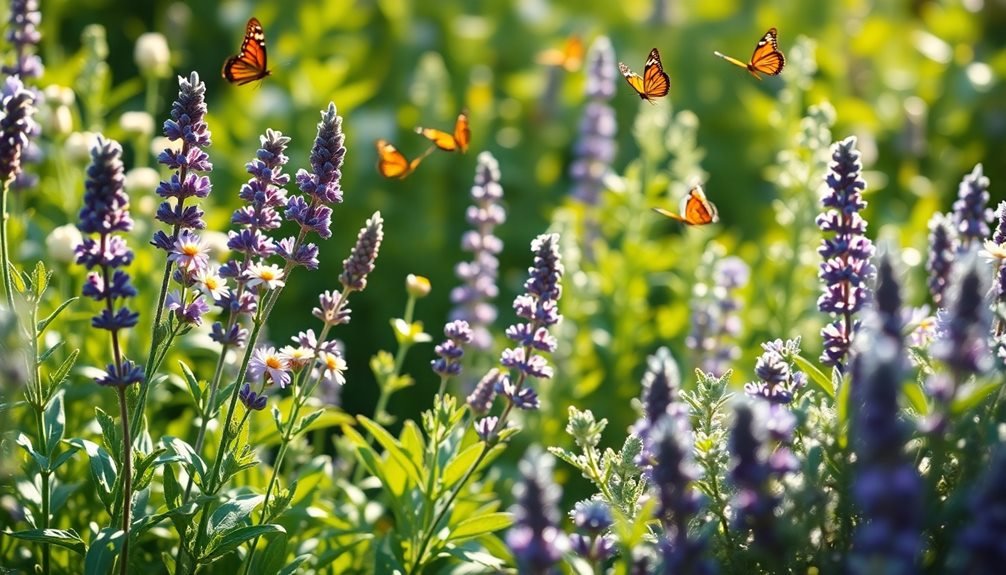
A centuries-old connection exists between herbs and human tranquility. You'll find that certain herbs possess remarkable abilities to soothe both your garden spaces and your mental state.
Lavender stands out as nature's premier stress-reliever, offering both fragrant purple blooms and calming essential oils that reduce anxiety and promote better sleep.
In your garden, you can create a dedicated relaxation zone with chamomile, known for its apple-like scent and ability to ease tension. Plant lemon balm nearby, as its citrusy leaves help lift your mood while attracting beneficial pollinators.
Passionflower, with its exotic blooms, climbs gracefully and provides natural support for managing stress and restlessness.
You'll benefit from adding holy basil (tulsi) to your herb collection, as it's revered in Ayurvedic medicine for reducing stress and enhancing mental clarity.
Consider incorporating rosemary, which not only provides year-round structure to your garden but also improves memory and concentration.
These herbs work double duty: they'll enhance your garden's biodiversity while offering natural remedies for modern life's pressures.
Growing Gardens, Growing Peace
Tending to a garden brings out an innate sense of tranquility that you won't find elsewhere. When you plant calming herbs like lavender, chamomile, and lemon balm, you're creating both a peaceful sanctuary and a natural pharmacy for stress relief.
| Herb Type | Benefits to Garden & Mind |
|---|---|
| Lavender | Attracts pollinators, reduces anxiety |
| Chamomile | Improves soil health, promotes sleep |
| Lemon Balm | Repels pests, boosts mood |
You'll discover that the rhythmic motions of gardening – planting, weeding, and harvesting – become a form of moving meditation. As you work with these aromatic plants, their essential oils release into the air, naturally reducing your stress levels and improving your focus.
Start small with a few chosen herbs in containers or a dedicated garden bed. You'll find that the simple act of nurturing these plants creates a positive feedback loop – the more you care for them, the more they support your mental well-being. By establishing this green sanctuary, you're investing in both your garden's health and your own peace of mind.
Mindful Moments Through Plant Care
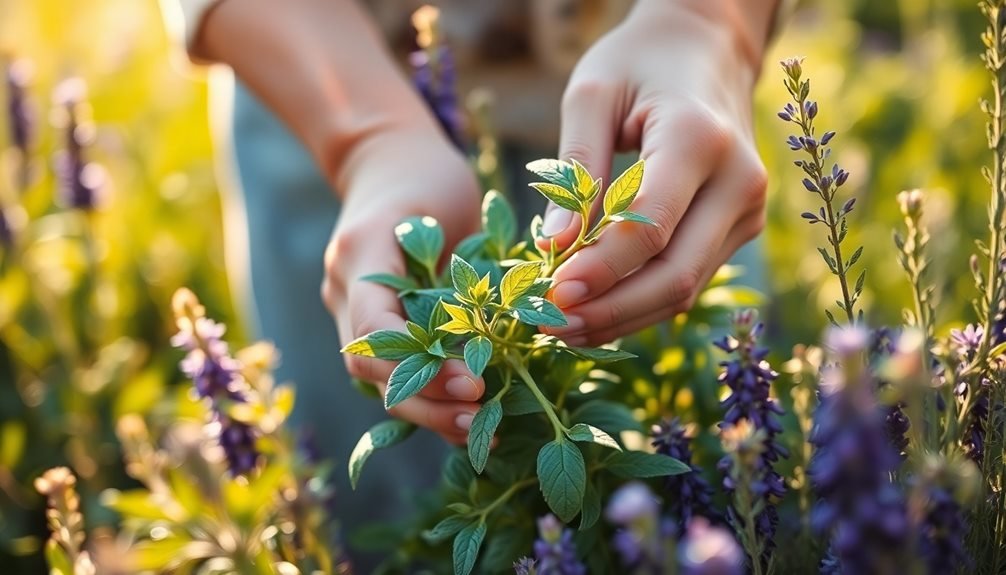
Three essential practices define mindful plant care: observing leaf patterns, feeling soil moisture, and listening to the rustling of leaves.
When you tend to your herbs mindfully, you'll discover that each plant interaction becomes a meditation in itself. By slowing down and focusing on these small moments, you're practicing presence while nurturing life.
You'll find that mindful gardening transforms routine tasks into opportunities for stress relief and mental clarity. As you prune your herbs, notice how each snip requires attention and care.
Watch how water droplets cling to leaves during morning mist, and observe the subtle changes in plant growth from day to day.
- Focus on the texture of each herb leaf – from fuzzy sage to smooth mint – to ground yourself in the present moment
- Practice deep breathing while watering, synchronizing your breath with the flow
- Set aside dedicated time for plant care without checking your phone or multitasking
- Notice how different herbs respond to touch, releasing their unique aromas
Through these mindful practices, you're not just growing herbs; you're cultivating a deeper connection with nature and yourself, creating moments of peace in your daily routine.
Healing With Aromatic Gardens
Fragrant herbs in your garden serve as natural mood enhancers and stress relievers. When you inhale their essential oils, you'll trigger responses in your brain's limbic system, which influences emotions and memory.
Lavender, for example, can reduce anxiety and improve sleep quality, while rosemary sharpens focus and memory retention.
You'll find that creating dedicated aromatic zones maximizes these benefits. Plant peppermint and lemon balm near seating areas, as their revitalizing scents can boost energy and mental clarity.
Position chamomile where you can brush against it during garden walks – its apple-like fragrance promotes relaxation and helps reduce tension headaches.
To intensify the therapeutic effects, you can combine herbs strategically. Plant sage alongside lavender to create a calming meditation space, or mix thyme with rosemary for an invigorating sensory experience.
Don't forget to include sweet marjoram, which releases a gentle, spicy aroma that helps relieve stress and promote emotional well-being.
Creating Your Therapeutic Herb Space
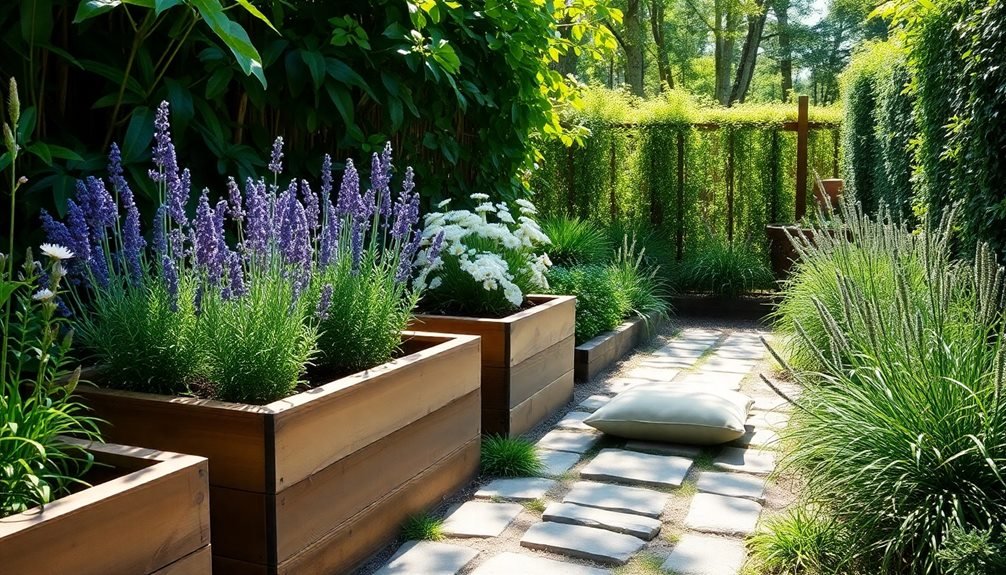
With the healing benefits of aromatic herbs in mind, designing your therapeutic garden space requires thoughtful planning and layout consideration.
You'll want to create distinct zones that maximize both accessibility and sensory engagement while maintaining a peaceful atmosphere for meditation and relaxation.
Start by selecting a location that receives adequate sunlight and offers some protection from strong winds.
You'll need well-draining soil and enough space to incorporate paths between your herb beds.
Consider raising your beds or using containers to make maintenance easier and prevent back strain.
- Position aromatic herbs like lavender and rosemary along walkways where you'll brush against them, releasing their calming scents.
- Create comfortable seating areas surrounded by herbs that attract butterflies and bees, enhancing your connection with nature.
- Group herbs with similar water needs together to simplify maintenance and prevent overwatering.
- Include vertical elements like trellises for climbing herbs, maximizing space and adding visual interest.
Remember to keep your most-used herbs closest to your home's entrance, making it convenient to harvest them for both culinary and therapeutic purposes.
This practical arrangement guarantees you'll regularly interact with your garden's healing elements.
Frequently Asked Questions
How Long Does It Take to Establish a Medicinal Herb Garden?
You'll need 3-6 months for basic herbs to mature, but a full medicinal garden takes 1-2 growing seasons to establish. Start in spring and expect perennial medicinal herbs to reach full potency by year two.
Can Indoor Herb Gardens Provide the Same Therapeutic Benefits as Outdoor Ones?
You'll still gain many therapeutic benefits from indoor herb gardens through aromatherapy, mindful care, and harvesting. While you'll miss direct sunlight and earthing benefits, indoor gardens offer year-round stress relief and satisfaction.
Which Herbs Should Be Kept Separate to Prevent Cross-Pollination?
You'll need to keep different varieties of mint, basil, cilantro, and dill separated in your garden. They're notorious cross-pollinators, so plant them at least 20 feet apart to maintain their distinct flavors.
Do Seasonal Changes Affect the Therapeutic Properties of Herbs?
You'll notice that herbs' therapeutic properties vary with seasons. Your summer-harvested herbs often have stronger essential oils, while spring herbs tend to be milder. Fall harvests can yield more concentrated medicinal compounds.
What Soil Ph Levels Work Best for Mental Wellness-Focused Herb Gardens?
You'll want to maintain slightly acidic soil with pH 6.0-7.0 for most therapeutic herbs. If you're growing lavender or sage, aim for 6.5-7.5, while chamomile and lemon balm prefer 5.5-6.5.
In Summary
You'll find that tending a mindful herb garden nurtures both your environment and inner peace. By growing calming plants like lavender, chamomile, and lemon balm, you're creating a sanctuary that engages all your senses. Whether you're harvesting fresh herbs for tea or simply sitting among their soothing aromas, you'll discover that these botanical allies offer a natural path to tranquility and mental clarity.

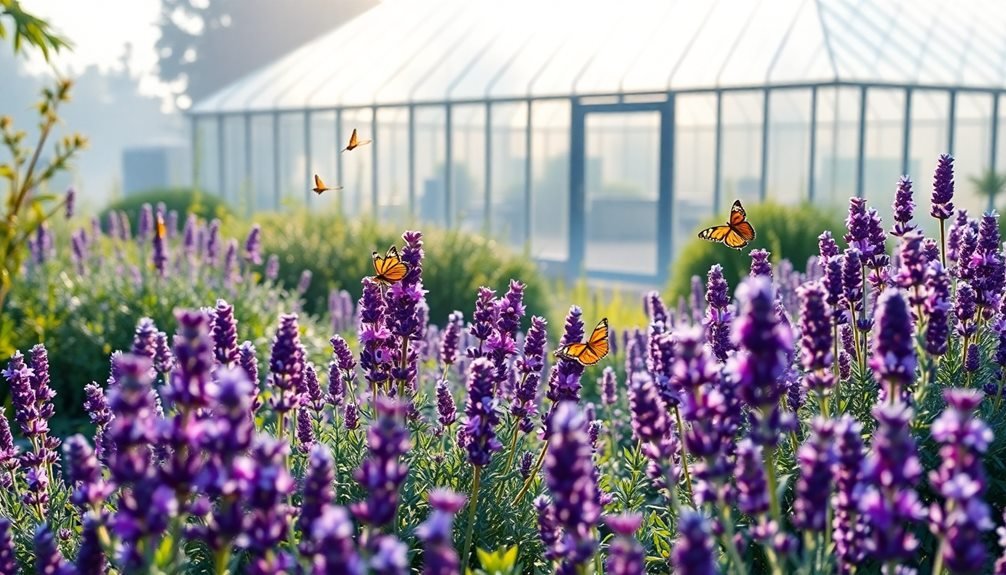


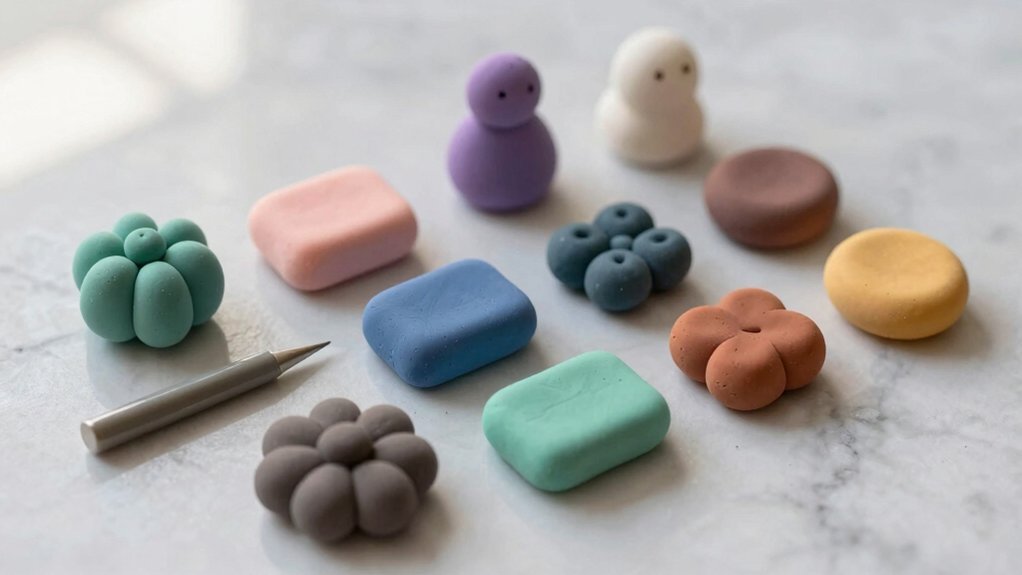
Leave a Reply